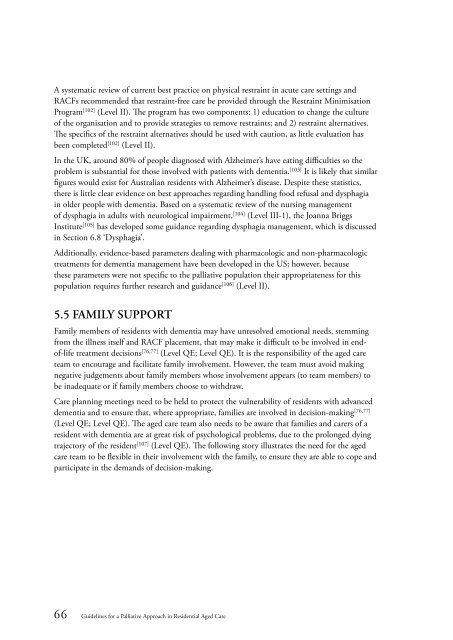Guidelines for a Palliative Approach in Residential Aged Care
Guidelines for a Palliative Approach in Residential Aged Care
Guidelines for a Palliative Approach in Residential Aged Care
Create successful ePaper yourself
Turn your PDF publications into a flip-book with our unique Google optimized e-Paper software.
A systematic review of current best practice on physical restra<strong>in</strong>t <strong>in</strong> acute care sett<strong>in</strong>gs and<br />
RACFs recommended that restra<strong>in</strong>t-free care be provided through the Restra<strong>in</strong>t M<strong>in</strong>imisation<br />
Program [102] (Level II). The program has two components: 1) education to change the culture<br />
of the organisation and to provide strategies to remove restra<strong>in</strong>ts; and 2) restra<strong>in</strong>t alternatives.<br />
The specifics of the restra<strong>in</strong>t alternatives should be used with caution, as little evaluation has<br />
been completed [102] (Level II).<br />
In the UK, around 80% of people diagnosed with Alzheimer’s have eat<strong>in</strong>g difficulties so the<br />
problem is substantial <strong>for</strong> those <strong>in</strong>volved with patients with dementia. [103] It is likely that similar<br />
figures would exist <strong>for</strong> Australian residents with Alzheimer’s disease. Despite these statistics,<br />
there is little clear evidence on best approaches regard<strong>in</strong>g handl<strong>in</strong>g food refusal and dysphagia<br />
<strong>in</strong> older people with dementia. Based on a systematic review of the nurs<strong>in</strong>g management<br />
of dysphagia <strong>in</strong> adults with neurological impairment, [104] (Level III-1), the Joanna Briggs<br />
Institute [105] has developed some guidance regard<strong>in</strong>g dysphagia management, which is discussed<br />
<strong>in</strong> Section 6.8 ‘Dysphagia’.<br />
Additionally, evidence-based parameters deal<strong>in</strong>g with pharmacologic and non-pharmacologic<br />
treatments <strong>for</strong> dementia management have been developed <strong>in</strong> the US; however, because<br />
these parameters were not specific to the palliative population their appropriateness <strong>for</strong> this<br />
population requires further research and guidance [106] (Level II).<br />
5.5 FAMILY SUPPORT<br />
Family members of residents with dementia may have unresolved emotional needs, stemm<strong>in</strong>g<br />
from the illness itself and RACF placement, that may make it difficult to be <strong>in</strong>volved <strong>in</strong> endof-life<br />
treatment decisions [76,77] (Level QE; Level QE). It is the responsibility of the aged care<br />
team to encourage and facilitate family <strong>in</strong>volvement. However, the team must avoid mak<strong>in</strong>g<br />
negative judgements about family members whose <strong>in</strong>volvement appears (to team members) to<br />
be <strong>in</strong>adequate or if family members choose to withdraw.<br />
<strong>Care</strong> plann<strong>in</strong>g meet<strong>in</strong>gs need to be held to protect the vulnerability of residents with advanced<br />
dementia and to ensure that, where appropriate, families are <strong>in</strong>volved <strong>in</strong> decision-mak<strong>in</strong>g [76,77]<br />
(Level QE; Level QE). The aged care team also needs to be aware that families and carers of a<br />
resident with dementia are at great risk of psychological problems, due to the prolonged dy<strong>in</strong>g<br />
trajectory of the resident [107] (Level QE). The follow<strong>in</strong>g story illustrates the need <strong>for</strong> the aged<br />
care team to be flexible <strong>in</strong> their <strong>in</strong>volvement with the family, to ensure they are able to cope and<br />
participate <strong>in</strong> the demands of decision-mak<strong>in</strong>g.<br />
66 <strong>Guidel<strong>in</strong>es</strong> <strong>for</strong> a <strong>Palliative</strong> <strong>Approach</strong> <strong>in</strong> <strong>Residential</strong> <strong>Aged</strong> <strong>Care</strong>
















